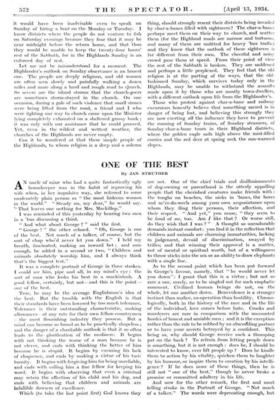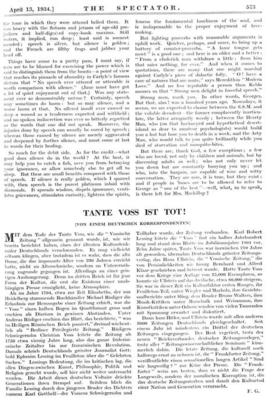ONE OF THE BEST
By JAN STRUTHER
AN uncle of mine who had a quite fantastically ugly housekeeper was in the habit of reproving his wife when, in her impulsive way, she referred to some moderately plain person as "the most hideous woman in the world." " Steady on, my dear," he would say. "That leaves one nothing for Mrs. Mackillop."
I was reminded of this yesterday by hearing two men in a 'bus discussing a third.
"And what about George ? " said the first.
" George ? " the other echoed. "Oh, George is one of the best. Not much of a talker, of course, but the sort of chap who'd never let you down." I held my breath, fascinated, making an inward bet ; and sure enough, he added in a second or two, "Children and animals absolutely worship him, and I always think that's the biggest test."
It was a complete portrait of George in three strokes. I could sec him, pipe and all, in my mind's eye : the sort of man who looks his best in a mackintosh. A good fellow, certainly, but not—and this is the point— one of the best.
True, he may be the average Englishman's idea of the best. But the trouble with the English is that their standards have been lowered by too much tolerance. Tolerance is their outstanding characteristic, making allowances—at any rate for their own fellow-countrymen –the most flourishing industry they possess. But a mind can become so broad as to be practically shapeless ; and the danger of a charitable outlook is that it so often leads to the glorification of the mediocre. It begins with not thinking the worse of a man because he is not clever, and ends with thinking the better of him because he is stupid. It begins by excusing his lack of eloquence, and ends by making a virtue of his taci turnity. It begins with forgiving him for being unreliable, and ends with calling him a fine fellow for keeping his word. It begins with observing that even a criminal may retain the affection of his child and his dog, and ends with believing that children and animals are Infallible dowsers of excellence.
Which (to take the last point first) God knows they are not. One of the chief trials and disillusionments of dog-owning or parenthood is the utterly appalling people that the cherished creatures make friends with : the toughs on beaches, the oicks in 'buses, the bores and ne'er-do-weels among your own acquaintance upon whom they fling their persons, their affection, and their respect. "And yet," you muse, "they seem to be fond of me, too. Am I like that ? Or worse still, do they wish that I was ? " A thought so unendurable demands instant comfort: you find it in the reflection that children and animals are charming immaturities, lacking in judgement, devoid of discrimination, swayed by trifles; and that winning their approval is a matter, not of mental or spiritual worth, but of a willingness to throw sticks into the sea or an ability to draw elephants with a single line.
As to the second point which has been put forward in George's favour, namely, that "he would never let you down": I grant that this is a virtue ; but not so rare a one, surely, as to be singled out for such emphatic comment. Civilized human beings do not, on the whole, let one another down. Benevolence is a stronger instinct than malice, co-operation than hostility. Chrono- logically, both in the history of the race and in the life of the individual, love comes before hate. Crooks and murderers are rare in comparison with the uncounted hordes of honest and amiable men ; and it is the exception rather than the rule to be robbed by an abscodding partner or to have your secrets betrayed by a confidant. This being so, why should George receive such a thumping pat on the back ? To refrain from letting people down is something, but it is not enough : does he, I should be interested to know, ever lift people up ? Does he kindle them to action by his vitality, quicken them to laughter by his humour, or inspire them to creation by his intelli- gence ? If he does none of these things, then he is still not "one of the best," though he never broke a promise or committed adultery in his life.
And now for the other remark, the first and most telling stroke in the Portrait of George. "Not much of a talker." The words were deprecating enough, but the tone in which they were uttered belied them. It was heavy with the flotsam and jetsam of age-old pre- judices and half-digested copy-book maxims. Still waters, it implied, run deep ; least said is soonest mended ; speech is silver, but silence is golden ; and the French are filthy frogs and jabber your head off.
Things have come to a pretty pass, I must say, if men are to be blamed for exercising the power which is said to distinguish them from the beasts—a point of view that reaches its pinnacle of absurdity in Carlyle's famous dictum that "No speech ever uttered or utterable is worth comparison with silence." (Jane must have got a lot of quiet enjoyment out of that.) Was any state- ment ever so demonstrably untrue ? Certainly, speech may sometimes do harm : but so may silence, and a worse harm at that. No offered insult ever caused so deep a wound as a tenderness expected and withheld ; and no spoken indiscretion was ever so bitterly regretted as the words that one did not speak. Moreover, the injuries done by speech can usually be cured by speech; whereas those caused by silence are merely aggravated and deepened by further silence, and must come at last to words for their healing.
So much for the debit side. As for the credit—what good does silence do in the world ? At the best, it may help you to catch a fish, save you from betraying your ignorance, or allow somebody else to get off to sleep. But these are small benefits compared with those of speech. If silence is really golden, which I quarrel with, then speech is the purest platinum inlaid with diamonds. It spreads wisdom, dispels ignorance, venti- lates grievances, stimulates curiosity, lightens the spirits, lessens the fundamental loneliness of the soul, and is indispensable to the proper enjoyment of love- making.
But fighting proverbs with reasonable arguments is uphill work. Quicker, perhaps, and surer, to bring up a battery of counter-proverbs. "A lame tongue gets nowt" is a good one ; and here is an older and a better : "From a cholerick man withdraw a little : from him that saies nothing, for ever." And when it conies to quotations, there are many that one might marshal against Carlyle's piece of didactic folly. " 0 ! have a care of natures that arc mute," says Meredith in "Modem Love." And no less reputable a person than Kehl° assures us that "Strong men delight in forceful speech."
Strong men, mark you. In other words, Georges. But that, alas ! was a hundred years ago. Nowadays, it seems, we are expected to choose between the S.S.M. and the voluble decadent—the former complacently inarticu- late, the latter arrogantly weedy ; between the Hearty Man, who (on that hackneyed and hypothetical desert. island so dear to amateur psychologists) would build you a hut but bore you to death in a week, and the Arty Man, who would talk to you quite brilliantly while you died of starvation and mosquito-bites.
But there are, thank God, a few exceptions ; a few who are loved, not only by children and animals, but by discerning adults as well ; who not only never let you down but are constantly buoying you up ; and who, into the bargain, arc capable of wise and witty conversation. They are rare, it is true, but they exist : and if people in 'buses are to be allowed to refer to George as "one of the best "—well, what, so to speak, is there left for Mrs. Maekillop ?

















































 Previous page
Previous page